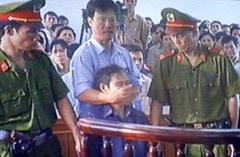By BEN STOCKING, Associated Press WriterWed Mar 28, 3:02 AM ET
Vietnam has abolished a measure used to hold dissidents without trial, a government official said Wednesday. However, analysts said the move could prove to be largely symbolic.
President Nguyen Minh Triet signed a decree last week to abolish "administrative probation," used to hold people suspected of national security crimes, a National Assembly official said on condition of anonymity, citing policy.
Analysts and Western diplomats praised the president's move, but said authorities still have ways to harass and detain pro-democracy activists who oppose the Communist Party's total control of the government.
"This measure has attracted the most criticism from human rights groups, and getting rid of it is a positive step," said Carl Thayer, a Vietnam expert at the Australian Defence Force Academy.
"But does it necessarily improve the ability of dissidents to operate in Vietnam? No."
The detention practice was first included in a piece of 1997 legislation known as "Decree 31."
It allowed provincial governors to impose administrative probation for up to two years on those who "violate the laws, harming national security, but not so serious as to justify prosecution."
Nearly 200 people are thought to have been held under the measure, including Thich Quang Do and Thich Huyen Quang, leaders of the outlawed Unified Buddhist Church of Vietnam.
Vietnamese courts still will be allowed to impose house arrest on people convicted of national security crimes.
The government has recently come under increasing criticism for launching a crackdown on the country's small number of political dissidents.
Catholic priest Nguyen Van Ly goes on trial this week, charged with undermining the government by trying to organize an independent political organization.
On March 6, police arrested and jailed Hanoi human rights lawyers Nguyen Van Dai and Le Thi Cong Nhan, accusing them of distributing information harmful to the state.
Human Rights Watch said the three had been targeted in one of the worst crackdowns on Vietnamese dissidents in 20 years.
Vietnam first raised the possibility of abolishing administrative probation in August 2006.
State-controlled media last September quoted a government report as saying that "in the initial stage of the revolutionary regime, this measure proved to be effective to defend the regime, maintain political security and social order."
"Apart from the achievements, this measure has shown many limitations in the context of recent international integration," the report said "Some regulations of the decree did not meet the rights of people enshrined in the Constitution."
The United States, the European Community and international rights groups have frequently criticized Vietnam for jailing dissidents, but Vietnamese authorities insist they only arrest people who violate the law.
Freedom of Speech Under Communism

Favorite Videos
We Will NEVER Forget.....

Favorite Links
Gone...but not forgotten.



Why this Blog?
There are 2 main reasons for this site:
1) There are many young Vietnamese who care about issues concerning Vietnam and the Vietnamese Diaspora, but cannot, or are not very proficient, at reading Vietnamese. Therefore, this site compiles and disseminates these news in English, so that the new generation of Vietnamese around the world can become more aware and, thus, closer to issues in the homeland.
2) Young Vietnamese have many ideas, many differing views on the prospects to democratize and develop Vietnam. The argument for peaceful development verses demands for justice and human rights. Which comes first? Can a civil, peaceful society be built without foundations of social justice?
These are the issues YOU can debate on this site. But remember, say what you mean, and mean what you say, but don't be mean when you say it.
1) There are many young Vietnamese who care about issues concerning Vietnam and the Vietnamese Diaspora, but cannot, or are not very proficient, at reading Vietnamese. Therefore, this site compiles and disseminates these news in English, so that the new generation of Vietnamese around the world can become more aware and, thus, closer to issues in the homeland.
2) Young Vietnamese have many ideas, many differing views on the prospects to democratize and develop Vietnam. The argument for peaceful development verses demands for justice and human rights. Which comes first? Can a civil, peaceful society be built without foundations of social justice?
These are the issues YOU can debate on this site. But remember, say what you mean, and mean what you say, but don't be mean when you say it.
Blog Archive
-
▼
2007
(106)
-
▼
March
(28)
- A Show (and Tell) Trial in Vietnam
- Dissident Catholic Priest Sentenced to 8 years in ...
- Dissident Catholic priest challenges Vietnam court
- The Not-So-New Vietnam - Wall Street Journal
- Vietnam repeals detention practice
- Vietnam crackdown targets dissidents
- Some liberties thrive, but communist regime allows...
- Democracy Alert: Growing Repression in Vietnam
- Vietnam Security Forces Threaten Family Members Of...
- Vietnam: Getting Away With Murder (Human Rights Re...
- Vietnam Watch News Roundup -- March 25, 2007
- Vietnam Watch News Roundup -- March 23, 2007
- Vietnam rejects Human Rights Watch's ‘wrongful rem...
- Vietnam Watch News Roundup -- March 21, 2007
- Journey from the Fall opens this Friday
- Interview with the wife of attorney Le Quoc Quan a...
- Human Rights Watch condemns Vietnam "crackdown" on...
- Vietnam to Consider Freeing Journalist After Inqui...
- Top Vietnamese Buddhist Slams Detentions Amid Ongo...
- Authorities refuse to renew BBC correspondent’s visa
- Republican lawmakers blast Vietnam rights violatio...
- Rep. Lofgren Calls on Secretary of State Rice to A...
- Vietnam: Crackdown on Dissent in Wake of WTO and APEC
- Kinks in Vietnam's armour
- 3,000 workers at Taiwanese factory in Vietnam go o...
- Vietnam police arrest two dissident lawyers in Hanoi
- Vietnam's communist authorities' desperate repress...
- Vietnam: A Paradise Haunted by Human Rights Abuse
-
▼
March
(28)

No comments:
Post a Comment